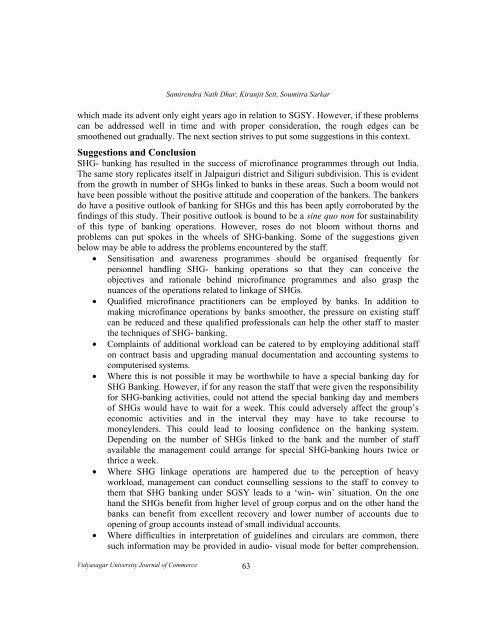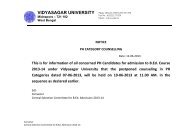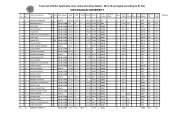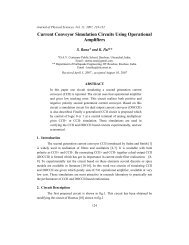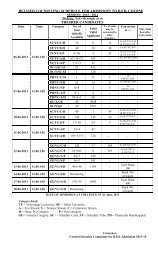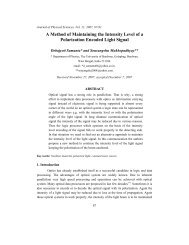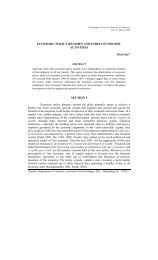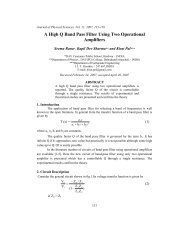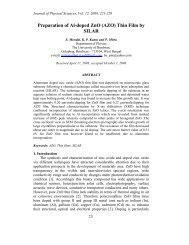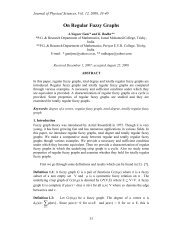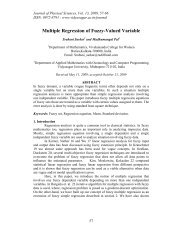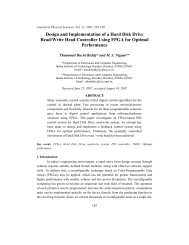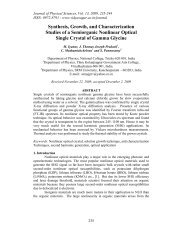VIDYASAGAR UNIVERSITY JOURNAL OF COMMERCE
VIDYASAGAR UNIVERSITY JOURNAL OF COMMERCE
VIDYASAGAR UNIVERSITY JOURNAL OF COMMERCE
You also want an ePaper? Increase the reach of your titles
YUMPU automatically turns print PDFs into web optimized ePapers that Google loves.
Samirendra Nath Dhar, Kiranjit Sett, Soumitra Sarkar<br />
which made its advent only eight years ago in relation to SGSY. However, if these problems<br />
can be addressed well in time and with proper consideration, the rough edges can be<br />
smoothened out gradually. The next section strives to put some suggestions in this context.<br />
Suggestions and Conclusion<br />
SHG- banking has resulted in the success of microfinance programmes through out India.<br />
The same story replicates itself in Jalpaiguri district and Siliguri subdivision. This is evident<br />
from the growth in number of SHGs linked to banks in these areas. Such a boom would not<br />
have been possible without the positive attitude and cooperation of the bankers. The bankers<br />
do have a positive outlook of banking for SHGs and this has been aptly corroborated by the<br />
findings of this study. Their positive outlook is bound to be a sine quo non for sustainability<br />
of this type of banking operations. However, roses do not bloom without thorns and<br />
problems can put spokes in the wheels of SHG-banking. Some of the suggestions given<br />
below may be able to address the problems encountered by the staff.<br />
• Sensitisation and awareness programmes should be organised frequently for<br />
personnel handling SHG- banking operations so that they can conceive the<br />
objectives and rationale behind microfinance programmes and also grasp the<br />
nuances of the operations related to linkage of SHGs.<br />
• Qualified microfinance practitioners can be employed by banks. In addition to<br />
making microfinance operations by banks smoother, the pressure on existing staff<br />
can be reduced and these qualified professionals can help the other staff to master<br />
the techniques of SHG- banking.<br />
• Complaints of additional workload can be catered to by employing additional staff<br />
on contract basis and upgrading manual documentation and accounting systems to<br />
computerised systems.<br />
• Where this is not possible it may be worthwhile to have a special banking day for<br />
SHG Banking. However, if for any reason the staff that were given the responsibility<br />
for SHG-banking activities, could not attend the special banking day and members<br />
of SHGs would have to wait for a week. This could adversely affect the group’s<br />
economic activities and in the interval they may have to take recourse to<br />
moneylenders. This could lead to loosing confidence on the banking system.<br />
Depending on the number of SHGs linked to the bank and the number of staff<br />
available the management could arrange for special SHG-banking hours twice or<br />
thrice a week.<br />
• Where SHG linkage operations are hampered due to the perception of heavy<br />
workload, management can conduct counselling sessions to the staff to convey to<br />
them that SHG banking under SGSY leads to a ‘win- win’ situation. On the one<br />
hand the SHGs benefit from higher level of group corpus and on the other hand the<br />
banks can benefit from excellent recovery and lower number of accounts due to<br />
opening of group accounts instead of small individual accounts.<br />
• Where difficulties in interpretation of guidelines and circulars are common, there<br />
such information may be provided in audio- visual mode for better comprehension.<br />
Vidyasagar University Journal of Commerce 63


